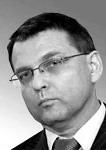We must throw hatred out of our hearts
Maybe Ben Kinglsey was right now when he said that only a story could help us to express what is so difficult to express and to articulate. That´s why I would like to tell you a short story, too. It is a story which was found in a diary of a prisoner from Auschwitz where he recalls the time of the liberation of this extermination camp. He mentions in one part of the diary an SS officer telling him on the last day: „ It does not matter what you will write or tell tomorrow, nobody will believe you anyway“.
I think that the SS guy was right. Could somebody really believe what happened in Auschwitz, Treblinka, Chelmno and many other places? Could somebody ever believe that Europe could have set the scene for the worst atrocities that a human can possibly conceive against other humans?
I once asked a Czech writer Arnost Lustig: „Why do you keep writing books with the same motives all over again?“ And his answer was: „I cannot give it up, I cannot stop. Because I still have the feeling that I am not able to express what I want to express. That I am still circling around without being able to get to the point“. He was right. The nitty gritty of this horror is slipping through our fingers and we cannot grasp it.
I have a notion. Perhaps we really needed many years to be able to start reflecting on shoah. I have become even more convinced about this after reading Yehuda Bauer. I am so sorry that this man is not here today. He made me believe that people whom we all believed to get it right, such as Hannah Arendt, Sigmund Baumann and others might have not got it entirely right. That´s why I am so firmly convinced that rethinking holocaust is necessary even today, decades after Auschwitz. And that´s why I am so glad that we are able to host the event „Let my people live“, here in Prague. And I am proud that I live in a country which, according to a recent poll, exhibits the fewest anti-Semitic sentiments in Europe. And I want Prague to be a place where shoah will be remembered, discussed and critically reflected upon.
I am deeply convinced that shoah is not only a history. It is still present all the time all over here. Let us not be mistaken, holocaust is not gone. It is still falling down on us like the ashes of the victims from the gas chambers. I know you might say that we live in Europe: peaceful, free, democratic, integrated and respecting human rights. I am not so sure about it though. Is it not in Europe where the massacre of Srebrenica happened exactly twenty years ago? And just about 23 years ago, in 1992, when the Mehmed Pasha Sokolovich bridge, celebrated in a world famous Ivo Andric book „Bridge over Drina“ set the scene for one of the worst bloodsheds of the Bosnian war, where thousands of Bosniaks were shot down to the river flowing under it? You might argue that these are horrible things, yet in terms of magnitude incomparable to Auschwitz. My answer is that it does not matter, as long as the evil which is the cause of both Auschwitz and Srebrenica – that is the hatred towards different race, ethnicity, nationality, religion or any sort of „otherness“ – is still with us. And I could quote also other places where genocide was committed after Auschwitz elsewhere in the world, most recently in Iraq and Syria.
You can say that today we are here in peaceful Prague, this quiet, pleasant city. But is it really so? Even nowadays, I keep meeting Jews in the streets of Prague who tell me that they are scared. Perhaps we cannot be surprised after what happened in Paris just a few weeks ago. But let us make no mistake : this hatred does not have to turn only against Jews. It can well turn against Muslims, Roma, Zoroastrians, foreigners, gays or disabled people. Let us remember, Auschwitz was about some of these groups too. And there are forces in Europe which are trying to build on the fear of the „other“ and pushing hatred. Allow me to conclude with one quotation. I will cite my favourite Czech philosopher Jan Blahoslav Kozák: „All the time, it is a must to throw this hatred out of our hearts like a manure by hay forks“.
Ladies and gentlemen, thank you.
(projev přednesený 27.1. na 4. mezinárodním fóru Let My People Live!)

 Chyba, kterou lidé nepochopí: Blažek nechce poslancům vysvětlovat, co a proč se stalo
Chyba, kterou lidé nepochopí: Blažek nechce poslancům vysvětlovat, co a proč se stalo Lidé čtěte!
Lidé čtěte! Fialova odpovědnost za Blažka je velká. Neměl ho nechat běhat se žlutou kartou
Fialova odpovědnost za Blažka je velká. Neměl ho nechat běhat se žlutou kartou Ukaž, co máš za auto, ať vím, co jsi vlastně zač. Britové "setřou" každou značku
Ukaž, co máš za auto, ať vím, co jsi vlastně zač. Britové "setřou" každou značku Fiala v ohrožení. Premiér místo vysvětlování raději otvíral sokolovnu u Brna
Fiala v ohrožení. Premiér místo vysvětlování raději otvíral sokolovnu u Brna

